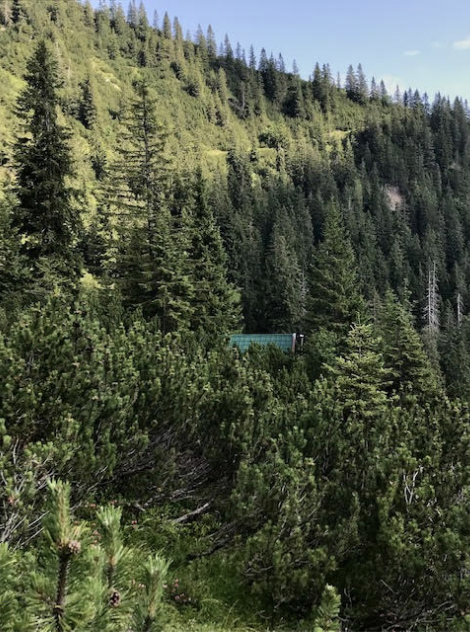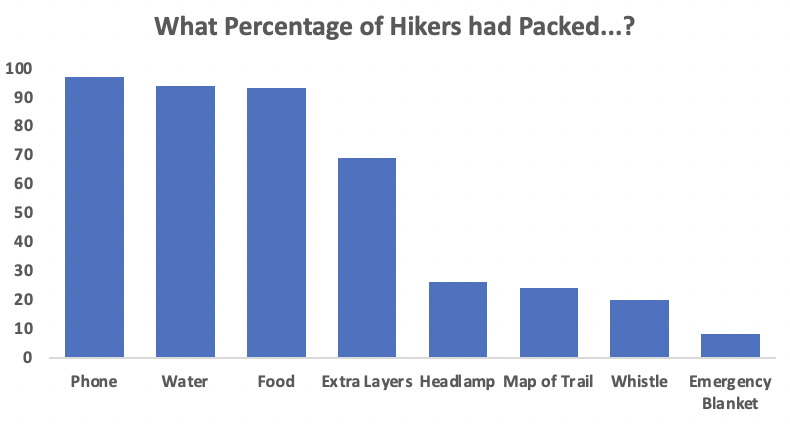No response, no Record
Search and Rescue statistics are black and white. At the end of the year we know exactly how many calls our volunteers have responded to. However, when we talk about prevention (the act of stopping something from happening) or “close calls” we simply have no records.
Admittedly, prevention may not be the most exciting branch of Search and Rescue, but it is an important task that we take seriously. The prevention team has logged 24,613 in-person contacts with members of the public and a combined 1,929 volunteer hours; on an almost daily basis we hear about close calls or accidents that could have been prevented – but there is no data available for calls that never happened. Even if it was a “close call”, if 911 wasn’t called for help there will be no record of the incident.
This is why prevention education is so important: maybe we only help prevent one accident from turning into a Rescue call. Maybe we prevent one hundred. Without clear data, we’ll never know but our goal is to share information that can help reduce the number of close calls by minimizing the frequency of accidents and reducing the severity when they do happen.
With Fall fast approaching our very own Christine Strub has her own close call story to share with us.

“As a teenager, I once decided to surprise my mom by hiking up to a nearby hunting cabin. The hut was remote and at the end of a steep ravine. Perfectly located to Fantastic Chamois viewing grounds. The hike should only have taken a little more than an hour with about 500m elevation gain over 5kms. At the time, I knew about trip planning but I had hiked the route before with my parents and all I knew was approximately how long it would take and how steep it was. I do not recall bringing much, definitely not the (10) essentials – cell phones were the stuff of science-fiction at that time!
I left right after work without letting anyone know, confident that I would make it to the cabin before it got dark. I was making good progress until it suddenly became dark in the trees, obscuring the path and making it hard to see. Navigation of any kind became difficult.
All of a sudden, out of nowhere the smell of a wood stove infiltrated my nostrils. The cabin was only a few hundred meters away! I was close but without a little luck I probably would have wandered right past it.
Thankfully, there was no rescue team needed that day, and I did not make the statistics. Considering that nobody even knew that I had left for that hike, a search would have been a long and challenging endeavour, quite possibly ending in a recovery.”
Survey Says…
Recently, at a trailhead near the Chief, we interviewed 271 adults and 4 children about their preparedness for the hike they planned to do that day.

- Our interviews revealed that 66% or people had told someone where they were going and when they will be back.
- Most groups had a map of the trails but 24% had no map and were unsure where to find one.
- 7% planned on using a street map (if they needed a map) and didn’t know that street maps are inappropriate for hiking.
- One third of all trail users didn’t know to call 911 in an emergency.
- Over 90% had food, water and a phone.
- 69% had extra layers but only 26% carried a headlamp, only 20% had a whistle and only 8% had an emergency blanket. Thankfully every group was given an emergency blanket and a whistle courtesy of the Squamish SAR prevention team.
None of the parties interviewed mentioned that they have called SAR before, but remember: we do not investigate close calls.
More and more people are venturing outdoors these days which means close calls will only become more frequent. The goal of the prevention team is to share our knowledge and experience with as many outdoor enthusiasts as possible to reduce the number of close calls and incidents, and also to reduce the severity when an accident does happen.
Accidents happen, that’s what we’re here for. But with a little preparation you too can help avoid becoming a statistic.
Fall Tip from our SSAR Prevention Team
Now that the days are getting shorter, start your outdoor adventure earlier than you think is necessary and be sure to leave yourself extra time to return – even if it means cutting your adventure short.
Always carry a headlamp (with extra batteries) and use your cellphone only for communication instead of as a light source or navigation aid.
When in doubt, stay put and call 911. Your local rescue team is ready.
Related Content: https://squamishsar.org/outdoor-safety/
Have Your Say
We love hearing from our community. Have you experienced any “close calls”? What did you do and what did you learn from your experience to prevent it going forward? Post in the comments section below.